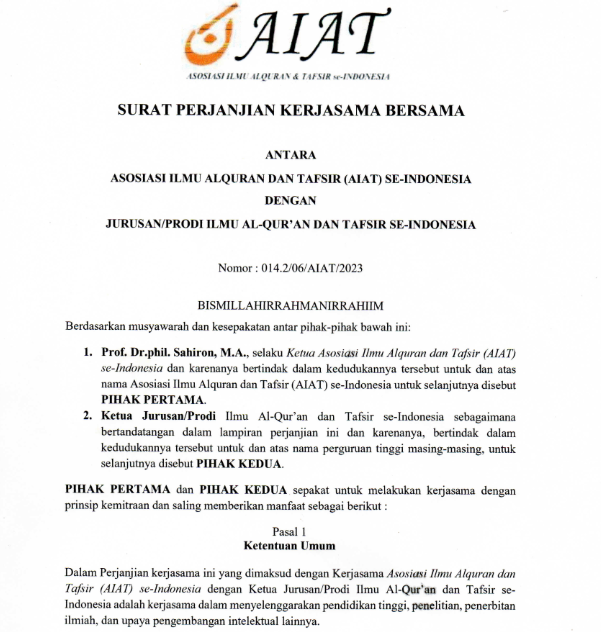Muhammad Abduh's Adabî-Ijtima'î pattern in Tafsir al-Manar
 Abstract views: 326
,
Abstract views: 326
,
 PDF downloads: 246
PDF downloads: 246
Abstract
This article aims to examine in depth the style of interpretation of adabî-ijtima’î. Muhammad Abduh considered some books of tafsir at that time and earlier times to be arid and rigid, because many interpreters directed attention to linguistic technicalities without paying attention to social aspects and eventually moved away from the purpose of the Qur'an. Abduh gave a breakthrough to this problem by presenting the style of tafsir adabî-ijtima’î, which is a style of interpretation of the Quran whose presentation emphasizes the beauty of language (literature). At the same time, the description of the discussion is more directed at socio-cultural criticism and community improvement based on the hidayah of the Qur'an. This article is the result of library research using a descriptive-analytical approach. The ijtima'î style is a tafsir that emphasizes an in-depth study of social and socio-cultural conditions by finding social "pathologies" in a society, mufassir tries to dig up instructions or guidelines from the Qur'an to improve the social conditions of the community. This method aims to free the mind from the shackles of taqlid and improve the Arabic style.
Downloads
References
Abdullah, Dudung, Pemikiran Syekh Muhammad Abduh dalam Tafsir Al-Manar, Jurnal Al-Daulah 1, no. 1 (2012).
Anshori LAL. Tafsir bi al-Ra’yi, Menafsirkan al-Qur’an dengan Ijtihad. Jakarta: Gaung Persada Press, 2010.
Anwar, Rosihon. Pengantar Ulumul Qur’an. Bandung: CV. Pustaka Setia, 2009.
Ayazi, Muhammad Ali. Al-Mufassirun Hayatuhum wa Manhajuhum. Teheran: Wizarah al-Tsaqafah wa al-Irsyad al-Islami, 1994.
Bahri, Syaiful. “Kontribusi Pemikiran Qasim Amin dalam Pembaruan Hukum Keluarga Islam.” Al-Ahwal: Jurnal Hukum Keluarga Islam 6, no. 1 (2016).
al-Dzahabi, Muhammad Husain. al-Tafsîr wa al-Mufasirûn, II. Cairo: Dâr al-Kutub al-Haditsah, 1976.
Fuadi, Muhammad Ali. “Ayat-ayat Pertanian dalam Al-Qur’an (Studi Analisis Terhadap Penafsiran Thanthawi Jauhari dalam Kitab al-Jawâhir fî Tafsîr al-Qur’an al-Karîm).” PhD diss., UIN Walisongo, 2016.
Kuntowijoyo, Paradigma Islam Interpretasi untuk Aksi. Bandung: Alfabeta, 1991.
Loeis, Wisnawati. “Nilai-nilai Pendidikan Islam dalam Tafsir Ahmad Musthafa Al-Maraghi: Studi Analisis terhadap Al- Qur’an Surat Al-Fîl.” Turats (Jurnal Pemikiran dan Peradaban Islam) 7, no. 1 (2011).
Mustashib, (al) Abdul Mazid Abdussalam. Visi dan Paradigma Tafsir Alquran Kontemporer, trans. oleh M. Maghfur W. Bangil: al-‘Izzah, 1997.
Namr, (al) Abdul Mun'im. ‘Ilm al-Tafsir Kayfa Nasha’a wa Tathawwaraha. Cairo: Dar al-Kutub al-Mishry, 1985.
Nasution, Harun. Muhammad Abduh dan Teologi Rasional Mu’tazilah. Jakarta: UI-Press, 1987.
Rida, Muhammad Rashid. Tafsir al-Manar. Mesir: al-Hai’ah al-Mishriyah, 1990.
Shihab, M. Quraish, Rasionalitas al-Qur’an: Studi Kritis atas Tafsir al-Manar, Tangerang: Lentera Hati, 2008.
Syamsi, Badarus. “Pemikiran Ali Abdurraziq Tentang Hubungan Islam dan Negara.” TAJDID: Jurnal Ilmu Ushuluddin 14, no. 2 (2015).
Tim Penyusun KBBI, 2005.
Wasid. “Dinamis-Rasionalis dalam Pemikiran Thaha Husain pada Problematika Peradaban Islam dan Barat.” Religió: Jurnal Studi Agama-agama 3, no. 2 (2013).
The journal operates an Open Access policy under a Creative Commons Non-Commercial Share-Alike license. All articles published Open Access will be immediately and permanently free for everyone to read and download.
• Creative Commons Attribution-NonCommercial (CC-BY-NC)

Revelatia: Jurnal Ilmu al-Qur`an and Tafsir by http://ejournal.iainmadura.ac.id/index.php/revelatia is licensed under a Creative Commons Attribution-NonCommercial 4.0 International License.
Based on a work at http://ejournal.iainmadura.ac.id.





















